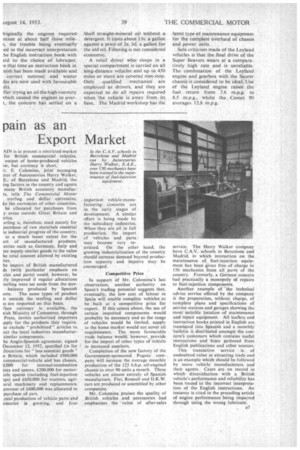pain as an Export Market
Page 41

If you've noticed an error in this article please click here to report it so we can fix it.
AIN is at present a restricted market for British commercial vehicles. output of home-produced vehicles but currency is short.
Ir. E. Colomina, joint managing ctor of Autocesorios Harry Walker, E.-, of Barcelona and Madrid, the ing factors in the country and agents many British accessory manufacrs, tells The Commercial Motor .sterling and dollar currencies, ke.the currencies of other countries, be allocated for purchases from y areas outside Great Britain and :erling is, therefore. used mainly for purchase of raw. materials essential se industrial progress of the country, to a much lesser extent for the nit of manufactured products. ntries such as Germany, Italy and ice supply similar-goods to the value he total amount allowed by existing he import of British manufactured ds (with particular emphasis on des and parts) could, however, be ll improved if regular allocations terling were set aside from the ster
balance produced by Spanish arts. The same types of product n outside the sterling and dollar is are imported on this basis.
Then currency is available, the nish Ministry of Commerce, through Press, invites authorized importers ipply for the products they .require. se exclude " prohibited" articles to :ect the local industries manufactursimilar components.
he Anglo-Spanish agreement, signed December 12, 1952, specified (in list .11ocations for " less essential goods" n Britain, which included £960,000 commercial-vehicle and bus chassis, 0,000 for internal-combustion ines and spares, £200,000 for motorice spares (including fuel-injection ms) and £650,000 for tractors, agrioral machinery and replacements. amount of £600,000 was allocated to purchase of cars.
_ocal production of vehicle parts arid esSorics is growing,' and four important vehicle-manufacturing' concerns are in the early stages of development. A -similar effort is being made by the subsidiary industries. When they are all in full production, the import of vehicles and parts may become very re
stricted. On the other growing industrialization of the country should increase demand beyond production capacity and imports may be encouraged.
Competitive Price
In support Of Mr. Colomina's last observation, another authority on Spain's trading potential suggests that, eventually, the low cost of labour in Spain will enable complete vehicles pto be built at a competitive price for export. If this comes about, the use Of certain imported components would probably be necessary and as the range of vehicles would he limited, supply to the home market would not cover all requirements. The more favourable trade balance would, however, provide for the import of other types of vehicle in increased numbers.
Completion of the new factory of the Government-sponsored Pegas6 • company will increase the average monthly production of the 125 b.h.p. oil-engined chassis to over 90 units a month. These vehicles are almost entirely of, Spanish manufacture. Fiat, Renault and D.K.W. cars are produced or assembled by other companies. Mr. Colomina praises the quality of British vehicles and accessories Lnd emphasizes the value of after-sales
service. The Harry Walker Company have C.A.V. schools in Barcelona and Madrid, in which instruction on the maintenance of fuel-injection equipment has been given free of charge to 150 mechanics from all parts of the country. Formerly, a German concern had practically a monopoly of repairs to fuel-injection components.
Another example of the technical advice service offered by the company is the preparation, without charge, of complete plans and specifications of service stations and garages showing the most. suitable location of maintenance and repair equipment. All leaflets and instruction books printed in English are translated into Spanish and a monthly bulletin iS distributed amongst the concern's cuStomers Which contains Useful instructions and hints gathered from English publications and other sources.
This translation service is of undoubted value in attracting trade.and is an example which should be followed by more vehicle manufacturers and their agents. Cases are on record in which dissatisfaction with a British vehicle's performance and reliability has been traced to the incorrect interpretafion . of the English instructions. An instance is cited in the preceding article of engine performance being impaired through Using the wrong lubricant:




















































































